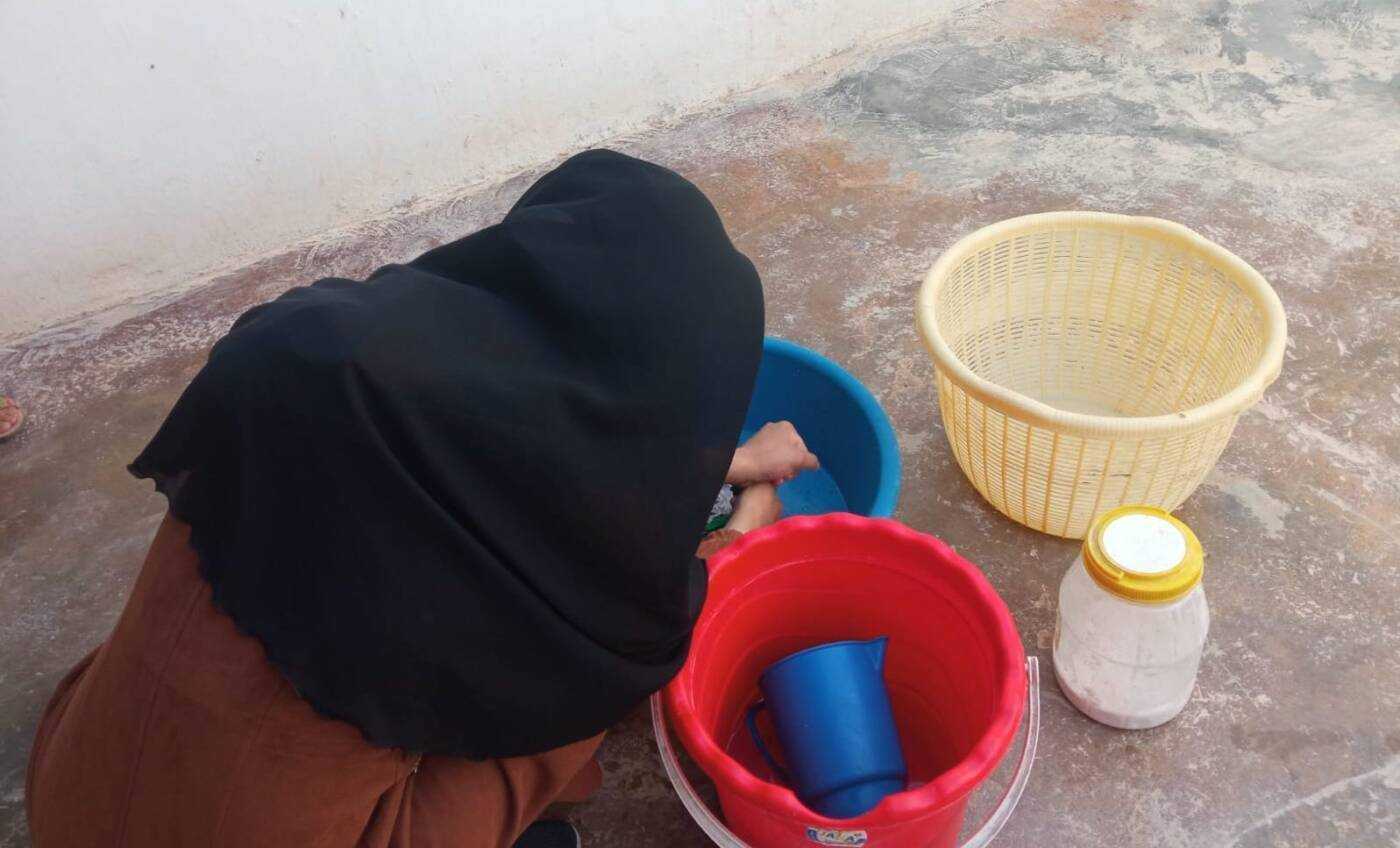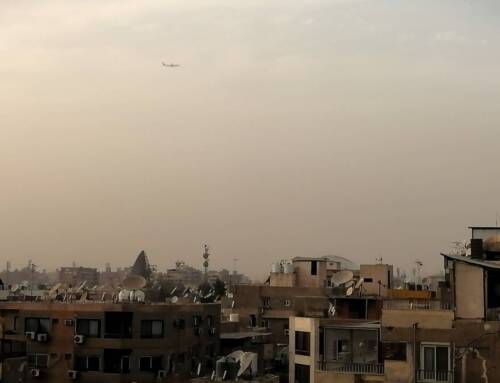Washing machine dreams in Idlib’s displacement camps
Women in Idlib’s displacement camps are working and strategizing to obtain washing machines and free themselves from the drudgery of hand washing.
16 August 2023
DEIR HASSAN — Samar Abdul Ghafur greets customers warmly at her shop, concealing her frustration at haggling over prices with a smile. She pictures the basket of laundry waiting at home, and remembers what she is working towards: an electric washing machine to free her from washing her family’s clothes by hand.
Abdul Ghafur, 30, opened her small shop near her residence in one of the displacement camps in the Idlib countryside village of Deir Hassan to sell “bags of potatoes, nuts and items for women and children.” Her husband is unemployed, and she works to provide for her three children and achieve her dream of “buying a washing machine,” she told Syria Direct.
It is a dream shared by many women in Syria’s northwestern Idlib province—especially those who are displaced and living in the area’s camps. A washing machine promises freedom from hand washing: a time-consuming task mainly done by women that is particularly onerous during the cold winter months.
Washing machines sell locally for between $80 and $100, depending on their quality. To raise the money, women like Abdul Ghafur are rolling up their sleeves and devising their own strategies.
It is not possible to count the exact number of families in Idlib that do not have access to washing machines. But in the Good Land camp in Salwah, a village near the northern Idlib town of al-Qah, some 70 percent of its 400 families do not have electric washing machines, camp director Abu al-Khair told Syria Direct.
Laundry woes
The washing machine has long been a staple in Syrian households, even in less affluent and impoverished regions. But after the Syrian revolution broke out in 2011, sieges, electricity cuts and waves of displacement and migration left owning a washing machine a distant dream for some families.
Bayan al-Walid, 23, and her husband fled Madaya village in Idlib’s southern countryside three and a half years ago. Today, they live with her husband’s family in the al-Salam camp in al-Qah, “having been provided a room in the family house as my husband couldn’t build one,” she told Syria Direct.
After moving in with her husband’s family, al-Walid found herself “managing all the household chores and taking care of seven people, including my husband and two kids.” Without a washing machine, “laundry has become a struggle,” al-Walid said, causing her “back pain and rough hands from using chemical cleaning products.” Every time she asks about getting a washing machine, the answer is, “we can’t afford one right now,” she added.
Al-Walid’s husband works as a motorcycle dealer, but does not have a steady income. Before they were displaced, he also farmed their family’s land. Back in Madaya, their home had all the appliances they needed, including a washing machine, but they left everything behind when they fled with only their clothes and a few belongings “to escape the regime’s bombing,” she said.
Persistence
Aisha, her husband and their two daughters live in a small house within al-Nahda camp in Deir Hassan. The dwelling, made up of one room, a kitchen and a nylon insulation roof, became their home after they fled al-Latamna, in Hama’s northern countryside, four years ago.
For years, Aisha washed her family’s clothes by hand until she was finally able to buy a twin-tub washer-dryer in late 2022 with money she saved from her earnings during the olive harvest season.
That year, Aisha went with her husband to work in the village of Dar Kir, in the Afrin countryside. They worked the harvest, then gleaned olives left on trees and the ground once it was complete.
It was hard work. Starting her day at four in the morning, Aisha often suffered back pain, but “when I remembered washing clothes by hand in the winter, I pushed through the pain to finish my work,” she said. Finally, she bought her washing machine for $90. Overjoyed, “ I bought sweets and shared them with my friends,” she recalled.
To fulfill her own aspiration of owning a washing machine, Muzna Khedr, 28, joined a savings circle with other women in her Idlib neighborhood. Each member contributes to the circle monthly, and one person receives the total saved each month.
Each month, Khedr paid 100 Turkish lira (around $4 with the exchange rate of TRY 26.94 to the dollar) from money sent by her brother in Turkey. He sent her TRY 200 ($8) each month, and she split it: half for her own expenses and half for the savings circle.
Shortly before the February 6 earthquake, she finally bought a machine. Using it for the first time felt like “a heavy weight had been lifted off my chest,” Khedr said. “I had been waiting for that moment for four years.”
For some, buying a machine is about knowing where to look. As 19-year-old Lama al-Bari could not afford a new washing machine, she turned to online marketplaces on social media, hoping to find a used one within her budget. “Something is better than nothing,” she said.
After around two months of searching, she stumbled upon “a cheap washing machine on Facebook for $40, half the price of a new one”—a purchase that rinsed away her hand-washing woes.
More expensive than the machine
For numerous displaced women in northwestern Syria—a region home to over four million individuals, half of whom are displaced—the challenge of affording a washing machine is real. But even when the financial barrier is overcome, there is another obstacle: running it.
In northwestern Syria’s opposition- and Hayat Tahrir al-Sham (HTS)-held areas, solar energy is vital for operating electrical appliances. In 2021, an estimated eight percent of the population relied solely on solar energy, while ten percent used it for hot water. A third of residents used it as a secondary source for light and charging batteries.
Setting up a solar energy system requires a solar panel (which costs between $25 and $45), a boost converter (around $26), a disconnect ($15) and a battery ($40-$100).
Unable to afford washing machines or electric power systems, some women in Idlib’s camps have embraced practical workarounds. These include “opting for dark-colored clothes for children, as they can be cleaned with cold water and dishwashing liquid, unlike white clothes that require hot water and detergent,” said Manar al-Khatib, who washes clothes by hand in Kafr Lusin.
Al-Khatib is from al-Kurkat, a village in the Qalaat al-Madiq area of the northern Hama countryside. When she was displaced four years ago, she left her home and appliances—including a washing machine—behind, thinking “we’d return after just a few days.”
Umm Omar, a 40-year-old mother of five originally from the Idlib village of Talmanas, lives in Killi city in two adjoining tents. There, she had a washing machine, but financial hardship forced her to sell it two years ago, she told Syria Direct.
Since then, she has been hand washing her family’s clothes, a burdensome task that becomes more challenging in the winter. “A pot of water stays on the heater on winter days. Once it’s warm, I wash a few pieces of clothes, dry them by hand and then put them on a dryer above the heater,” she explained.
Summer or winter, Umm Omar spends her life “washing and drying,” she said. Her young children change clothes frequently, and are too young to help her with laundry.
While Abdul Ghafur spends her days at her little shop working towards buying a washing machine that could ease her load, Umm Omar is holding onto a more distant dream. She does not leave the house for work or to visit friends, spending her entire day tending to her young children and housework.
**
This report was produced as part of Syria Direct’s MIRAS Training Program, in collaboration with Violet Organization, for early-career journalists in northeastern Syria. It was originally published in Arabic and translated into English by Nouhaila Aguergour.







